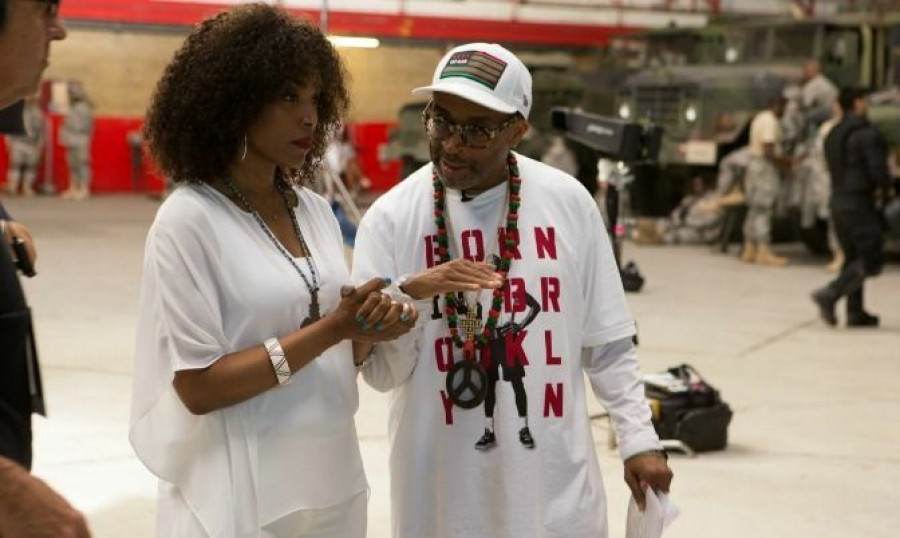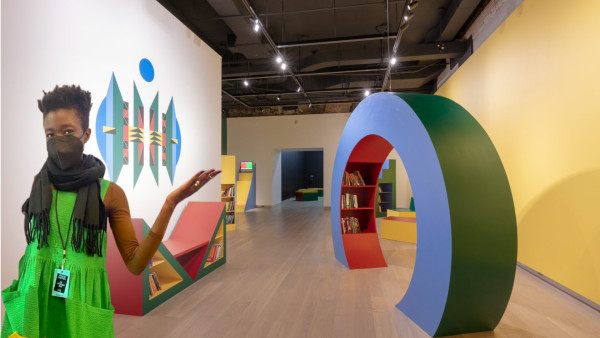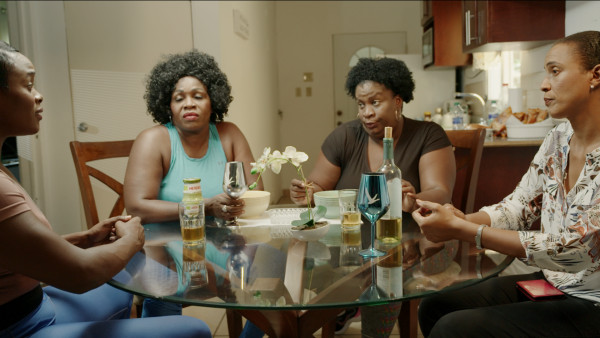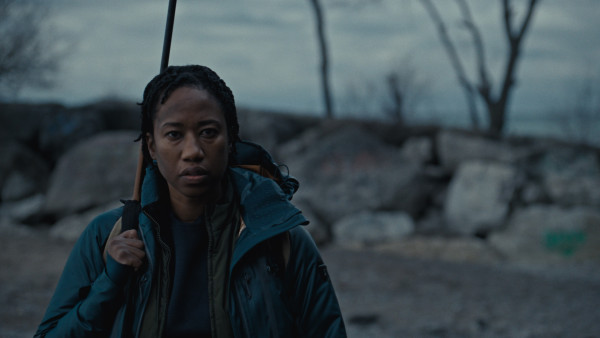We become smaller versions of ourselves. We are quiet and contained. We are careful and nervous, counting our words on one hand and planning meticulously to say the perfect thing on the other.
This is my mood as I wait to interview Spike Lee. I am pensive hoping I ask the right questions. I am not alone. Time is limited and questions are few. We are meant to sit at a round table but Spike moves the interview to a more casual setting: a couch in the corner. He cracks a few jokes and we’re off. All six of us. The time slot is shared, but as I would find out at the end of the 30 minutes, Spike Lee has a way of paying attention to everyone in his presence.
For a man who stirs up so much controversy, he is the calm in the room. I am almost certain I hear teeth chattering, journalists on their toes waiting to pounce. His new film Chi-raq has brought us here. It premieres in Toronto, tomorrow night at the TIFF Bell Lightbox.
Chi-raq was originally titled, ‘The city of broad shoulders”, however, during his research Spike Lee encountered the local name of ‘Chiraq’. A term made popular by Chief Keef when he spits the line, “I’m from Chiraq, we got more killers than Afghanistan”, in his song, ‘Don’t Make No Sense’.
The film uses an old story to tackle a modern problem. In an interview with ABC, Spike Lee said, “This film is not a joke.” It’s an important statement about a movie that’s foundation is in a Greek comedy, Lysistrata from 411 B.C.
Lee’s film is not a comedy; it is satire. Yet, the film is an important one for Lee. An artful, but fearless film designed to disrupt the status quo and divert much-needed attention to Chicago’s very real crime problem.
In the Spike Lee Joint, Lysistrata (Teyonnah Parris) falls in love with aspiring rapper Demitrius “Chi-raq” Dupree (Nick Cannon) but she is disturbed by the bloody war between his Spartan gang and the rival Trojans led by Cyclops (Wesley Snipes).
When Patti, an 11-year-old neighbour is killed, Lysistrata is shaken and seeks to end the violence. She persuades the Spartan and Trojan women to withhold sexual privileges until the fighting stops. It is this ‘sex strike’ that Lee pulls from the original story by Aristophanes. One can see how this premise would raise a few eyebrows. The idea of women using sex to end violence in the 21st-century counters the very foundations of feminism and womanism. A point that is all but irrelevant because Lee’s choice to keep the sex strike is an artistic one. In doing this, Lee has stayed true to the source material. AND, in doing this, the women in Chi-raq are strong, confident and sexually expressive. “I think Black women should be proud of their sexuality,” says Lee. I suspect he ponders this frequently as he responds to my question of feminist backlash against Chi-raq, a response he says is “not new” to his films. He is confounded by this continuous and unsurprising Black feminist and womanist critique of his work.
“What is the difference between the women in Chi-raq and Beyonce’s video for Formation?” he asks while acknowledging that “it’s not all feminists" who criticize his work and that he loves Formation.
It has been 30 years since the release of his first film, ‘She gotta have it’. A film that many women still haven’t forgiven Lee for, but we digress.
For the light bit of humour one can find in Chi-raq, Lee spent six months researching Chicago for this film. Like all others before it, Chiraq is deliberate and intentional in the discomfort it aims to create. Integral to Spike’s ‘Lysistrata’ is social media. “We often ignore the impact of social media on crimes committed,” Lee says. “A large number of crimes are committed after a social media post. It spurs the violence on.” Lee goes on to say that “In Chicago more than any other city, the more dead bodies under your belt, the cooler you are and that’s not okay.”
The statistics support Lee’s message and his obvious concern. In West Garfield Park, a predominantly African-American community in Chicago, there are 64 deaths per 100,000 people. That is by no means a small ratio. Considering all this information and witnessing the marriage of bravado and violence, why would Spike Lee make a film that is satire? Satire which he admits, “the people don’t seem to get”. And like the feminist outrage, Spike is somehow not fazed by the “why is this a satire?” outrage.
Satire is clearly a style that Lee is drawn to and he refuses to be immobilized by criticism and ‘blowback’. Moreover, he won’t be made small by the non-acceptance of others. In a world that tells Black men and women to conform for respect, for acceptance, for staying alive, Spike Lee is the exception. Chi-raq proves this. “It is easy to be labelled the angry Black man and I’m okay with that. We knew going in that people were going to be upset about the film.” “In doing this film, I didn’t want to be exploitative. We thought about depicting the violence in the film. You don’t see the daughter of Jennifer Hudson’s character die. You don’t see bloodshed.” These were deliberate choices to maintain the integrity and dignity of the people of Chicago. He speaks of the city with affection and admiration. Lee’s ultimate goal for the film is to save lives.
It is easy to define someone by their work. Something Lee is acutely aware of when he says a journalist can define you “by one word” and it becomes who you are. However, the thirty minutes I spent with Spike Lee has put my own judgement and privilege into perspective. In doing so, it has reminded me that life is a constant learning curve, a revolving opportunity to be better than you were yesterday. This is the call out being made by Chi-raq. As humans, we must strive to be better than we were yesterday. If you think about it, why not tell this story as a satire? It forces us to ask the question: Why is this our reality?
Chi-raq opens in Toronto Friday, March 18th, 2016 at the TIFF Bell Lightbox, in Vancouver at VanCity Theatre and in Calgary at The Globe on April 1st. It will be released on iTunes Canada on March 18, 2016.

 By
By 








